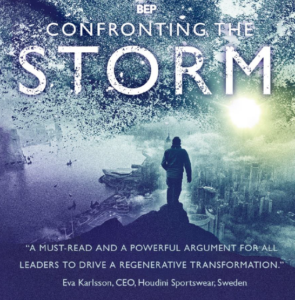 Humankind has not woven the web of life. We are but one thread within it. Whatever we do to the web, we do to ourselves. All things are bound together. All things connect. – Chief Seattle
Humankind has not woven the web of life. We are but one thread within it. Whatever we do to the web, we do to ourselves. All things are bound together. All things connect. – Chief Seattle
In 1983, the UN General Assembly called for a “global agenda for change” to consider how the international community could better deal with social and environmental issues. The resulting “Our Common Future” Report made the following key point:
“Humanity has the ability to make development sustainable to ensure that it meets the needs of the present without compromising the ability of future generations to meet their own needs”.
Yet, many people, including myself, see how sustainability efforts have since evolved: to become little more than the application of a bandage on a large, extraordinarily deep wound. Our social, environmental, and economic challenges remain profound.
The sustainability field has been unsuccessful in positively shifting these trajectories. This “(un)sustainability” is a consequence of a predilection on incrementalism and on addressing symptoms rather than root causes to “enable continuous economic development within a context of finite resources.” It is about specifically sustaining business as usual.
This has created notable risks for executive members; make no mistake that their organisations’ efforts are often seen by stakeholders for what they were: nothing more than greenwash. That is, deeply cynical marketing efforts to portray organizations to be something that they weren’t – socially, economically, or environmentally mindful. And the risk of losing the trust of staff, customers, or regulators – adversely affecting organizational reputation – is significant. As these issues grow in scale and complexity, so too, the murmurings and concerns within society progressively grow, unabated.
We need to rethink our efforts. We need to transcend sustainability and reflect more on what we collectively value.
So too there are those who believe that the term sustainability is now inadequate. I believe that the term has been sullied by these superficial efforts of so many organizations. What has been realized is that these efforts need to be working towards something far more significant. In the current context, it is about working systemically towards strengthening that which underpins the health, quality of life and resilience of the planet to ensure that life, including our own, doesn’t just survive but flourishes.
Anchored to the Past
Even without consideration of the momentous and interwoven change inferred, we run the risk of remaining anchored to behaviors that were appropriate in the past but now seem to have little rhyme or reason. From a leadership perspective, we run the risk of not readily adapting to what we are now experiencing.
Now, I have no doubt that leaders have always had notable challenges. However, by the 1970s it had become apparent that organizations were operating within a changing context where it wasn’t only tame problems that had to be dealt with. Wicked social, economic, and environmental problems were already occurring, bearing challenges for organizations and their leaders.
In such a context, what got leaders to “here” was most certainly not going to get them to “there”.
If we don’t question the dominant thinking in our organizations, leaders run the sizeable risk of having to face costly, damaging, long-term outrage and mistrust. The consequences are overwhelming.
What is the dominant story about leadership in your organization? Does it reflect 20th Century thinking? Is that appropriate as we experience momentous change?
What does sustainability or CSR look like in your organization? Is it an awkward, greenwashed add-on solely for short-term profits? Or is there a strategic benefit?
Bio:
Working as a VUCA Strategist, David Ross helps organizations to protect or reclaim their reputation and performance by successfully navigating their organizations through the stormy waters of operating in a volatile, uncertain, complex and ambiguous (VUCA) world. He achieves this by helping to empower leaders and affected stakeholders to find lasting solutions to their most complex and contentious economic, social and environmental issues.
He has postgraduate and graduate qualifications in executive business administration, futures studies, advance conflict transformation, leadership, environmental engineering and ecology. David is currently writing a book on the leadership required to deliver sustainable development outcomes in a VUCA world and is co-authoring a book with Bob on how organizations can tackle climate change.
For more information, head to: https://www.confrontingthestorm.global/
